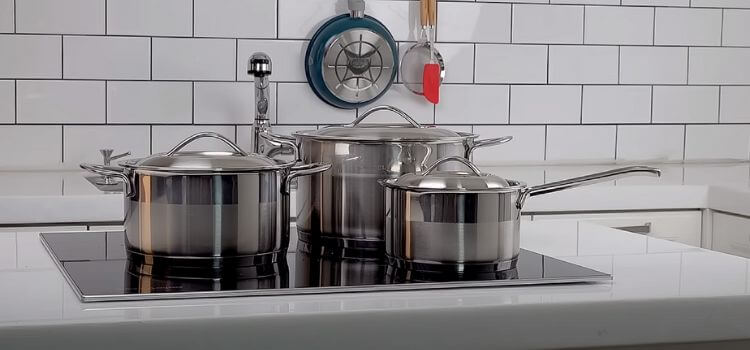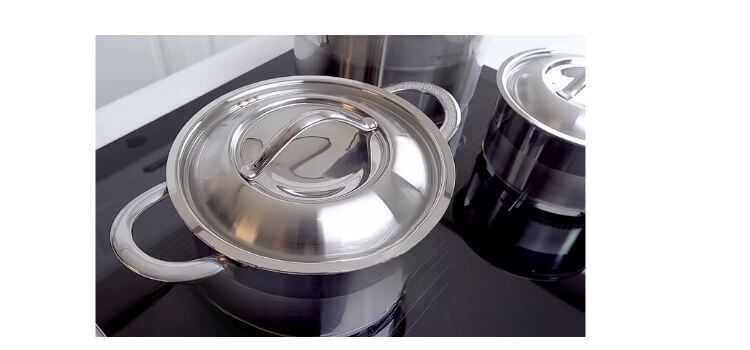
Aluminum cookware is not banned in Europe, but there are safety regulations in place. These regulations ensure that aluminum levels in cookware remain within safe limits.
Aluminum cookware has been a topic of discussion among health-conscious consumers and regulatory agencies. Concerns over aluminum exposure and its potential health risks have prompted European authorities to implement strict safety standards rather than a complete ban.
The European Food Safety Authority (EFSA) monitors the amount of aluminum permissible in products that come into contact with food.
Cookware made of aluminum must adhere to these guidelines to be available in the European market. Consumers increasingly seek information about the materials in their kitchen tools, pushing manufacturers to be transparent about their product’s safety.
This vigilance reflects a broader trend toward health-centric choices in household goods, with European regulation often setting a standard for global practices.
Aluminium Cookware Banned in Europe

Europe has set a new precedent in food safety. A ban on aluminum cookware is now in effect. This decision impacts kitchens across the continent. Health concerns led to this major change. Many European citizens support the safety measures. Let’s explore what moved Europe to this decision.
Catalysts Leading To The Decision
Several key factors prompted the ban on aluminum cookware:
- Scientific Research: Studies showed potential health risks from aluminum exposure
- Safety Concerns: Long-term use of aluminum items is linked to health issues.
- Public Pressure: Consumers demanded safer cookware options.
- Regulatory Recommendations: Health and food safety authorities recommended the ban.
Countries Enforcing The Ban
The following countries have implemented the ban:
| Country | Date of Ban |
| France | January 2020 |
| Germany | March 2021 |
| Italy | June 2021 |
| Spain | September 2021 |
Other countries are considering similar actions. The list will grow as more join the initiative. This ban reflects a shift towards health and what comes into contact with our food.
Implications For Public Health
The recent ban on aluminum cookware in Europe has surfaced as a paramount shift in public health policy. This significant move aims to safeguard consumers from the potential risks associated with the prolonged use of aluminum utensils.
Assessing the implications for public health unfolds an informative and consequential narrative for our daily living.
Health Concerns With Aluminium Exposure
Aluminium, a metal found commonly in kitchenware, poses health concerns. Over time, cooking acidic foods in an aluminum can cause the metal to leach into food.
Excessive intake of aluminum may be associated with several health issues:
- Neurological effects, such as impaired cognitive functions.
- Potential links to Alzheimer’s Disease.
- Affected bone health.
- Iron absorption disruption.
The decision to ban aluminum cookware stems from these risks, focusing on prevention as a cornerstone for ensuring public health.
Expected Health Benefits Post-ban
Eliminating aluminum cookware from European kitchens envisages diverse health benefits. Notable expected outcomes include:
| Aspect of Health | Benefit |
| Neurological | Reduced exposure-related risks |
| Chronic Disease | Lowers the potential for related illnesses |
| Bone Health | Improved density and strength |
| Iron Absorption | Better nutritional balance |
Adherence to this regulation could enhance the general well-being of the populace. It promotes awareness about the dangers of unsafe cooking practices.
Choosing safer alternatives will ensure healthier cooking environments and, importantly, healthier citizens in Europe.
Impact On The Cookware Industry

The recent European aluminum cookware ban has sent ripples through the cookware industry. This significant decision demands a critical look at how the industry will evolve.
Manufacturers and consumers alike brace for the sweeping changes that will redefine European cooking practices.
Changes In Manufacturing Practices
The ban necessitates a major overhaul of current manufacturing processes. Cookware companies must now invest in research and development to find new methods that comply with regulations. These changes include:
- Upgrading equipment to handle new materials
- Training staff in new production techniques
- Implementing quality control systems to ensure safety standards
Shift To Alternative Materials
In response to the ban, the quest for safe alternatives has intensified. Materials like stainless steel, ceramics, and glass rise in popularity due to their non-toxic properties. The shift brings:
- A surge in demand for alternative materials
- Product line revisions to include safer options
- New marketing strategies highlighting the benefits of these materials
Consumer Reaction And Adaptation
Europe’s recent decision to ban aluminum cookware startled many households. As citizens grapple with understanding the implications, their quick adaption highlights a proactive community.
This section dives into how consumers have responded to this change and the emerging patterns in kitchenware shopping.
Public Perception Of The Ban
Initial reactions were mixed, ranging from concern to support. Many feared potential health hazards linked to prolonged aluminum exposure.
Others welcomed the ban, praising the shift towards healthier living standards. Information campaigns played a key role in easing minds and clarifying misconceptions.
- Social media buzz with opinions and questions
- Information drives by health organizations spiked
- Consumer forums conducted rigorous discussions
Trends In Cookware Purchases
With aluminum off the shelves, shoppers swiftly pivoted towards alternatives. Popular choices now include:
| Material | Reason for Popularity |
|---|---|
| Stainless Steel | Durability and ease of cleaning |
| Ceramic | Non-toxic and eco-friendly |
| Cast Iron | Longevity and even heat distribution |
| Non-stick without PFOA | Health-safe and easy-to-use |
Cookware manufacturers reported a notable surge in alternative cookware sales. Retailers highlighted customer inquiries for items with health certifications like ‘PFOA-free’ as pivotal in their decision-making.
Online shopping platforms saw a spike in searches for safer cookware options, thus adapting their inventory to meet the new demand.
Environmental Considerations
Environmental Considerations have become crucial in the debate surrounding aluminum cookware. European decisions to move away from such products stem from ecological impacts.
This includes the entire lifecycle of aluminum and its recyclability. Let’s explore these factors in detail.
The Lifecycle Of Aluminium Products
Aluminum production starts with mining bauxite. This process harms the environment. It destroys habitats and pollutes air and water. Next, refining bauxite into aluminum requires a lot of energy. It releases large amounts of carbon dioxide. Finally, the production of cookware adds more energy consumption and emissions.
Once in use, aluminum pots and pans conduct heat well. This means they help save energy while cooking. But the real problem occurs at the end of their life. Disposing of aluminum negatively impacts the earth. It may require as long as 500 years to undergo decomposition.
Prospects For Recycling Initiatives
Aluminium is 100% recyclable. It retains its properties after recycling. This means less environmental harm in the long run. The good news is that recycling saves up to 95% of the energy needed to produce new aluminum.
Europe’s ban encourages better recycling systems. This helps reduce waste and conserve resources. Recycling initiatives can also create jobs. They support a more sustainable future. Look for these eco-friendly alternatives in your home for a positive environmental impact.
Legal And Regulatory Framework
The Legal and Regulatory Framework surrounding cookware is pivotal for consumer safety. Concerns over aluminum leaching into food have led to significant legislative action within European territories. Understanding the legal intricacies and how they affect both manufacturers and consumers is essential.
Details Of The Legislation
The European Union has enacted strict regulations to oversee the use and sale of aluminum cookware. The legislation focuses on limiting exposure to aluminum, which studies suggest may present health risks.
- Threshold Limits: Legislation sets maximum allowable aluminum migration levels.
- Material Guidelines: Specifies approved materials for cookware.
- Labeling Requirements: Mandates clear labeling for consumer awareness.
Compliance And Enforcement Mechanisms
Compliance with the new standards is non-negotiable. A series of enforcement mechanisms ensures adherence:
- Inspections: Regular checks on manufacturers take place.
- Testing: Cookware undergoes rigorous testing for aluminum levels.
- Penalties: Non-compliance can result in fines or bans.
These mechanisms work together to protect public health and ensure fairness in the market.
Frequently Asked Questions Of Aluminium Cookware Banned In Europe
Why Is Aluminium Not Safe For Cooking?
Aluminum may be unsafe for cooking as it can leach into food, especially with acidic ingredients, potentially posing health risks if ingested in large amounts.
Why Is Aluminum No Longer Used For Manufacturing Cooking Pots?
Aluminum is less used for cooking pots due to potential health risks from leaching and its tendency to warp under high heat. Stainless steel and cast iron offer safer, more durable alternatives.
Conclusion
Understanding the implications of the aluminum cookware ban in Europe is crucial for consumers and manufacturers. It reflects a commitment to health and environmental standards. Adapting to alternative materials can ensure kitchen safety and sustainability. Let’s embrace this change for a safer, greener future.
Related Post
Is Granite Cookware Safe
Is Enameled Cast Iron Cookware Safe for Cooking
Is Figment Cookware Non-Toxic
Is Titanium Cookware the Safest Choice for Your Kitchen
Leave a Reply